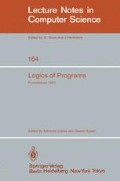This research has been partially supported by the National Science Foundation under grant MCS81-04209 and by DARPA under contract N00039-82-C-0250.
Preview
Unable to display preview. Download preview PDF.
References
H. Andreka, I. Nemeti and I. Sain. A complete logic for reasoning about programs via nonstandard model theory. Theoretical Computer Science 17 (1982), pp. 193–212, 259–278.
R. Boyer and J Moore. Proving Theorems about LISP Functions, JACM 22, 1 (January 1975), pp. 129–144.
R. Boyer and J Moore. A Computational Logic, Academic Press, New York, 1979.
R. Cartwright. User-Defined Data Types as an Aid to Verifying LISP Programs. Proceedings of the Third International Colloquium on Automata, Languages, and Programming, S. Michaelson and R. Milner, eds. Edinburgh Press, Edinburgh, 1976, pp. 228–256.
R. Cartwright. A Practical Formal Semantic Definition and Verification System for Typed LISP, Stanford A. I. Memo AIM-296, Stanford University, Stanford, California, 1976 (also published as a monograph in the Outstanding Dissertations in Computer Science series, Garland Publishing Company, New York, 1979).
R. Cartwright. First Order Semantics: A Natural Programming Logic for Recursively Defined Functions, Technical Report TR 78-339, Computer Science Department, Cornell University, Ithaca, New York, 1978.
R. Cartwright. Computational Models for Programming Logics, Technical Report, Computer Science Program, Mathematical Sciences Department, Rice University, 1983.
R. Cartwright. Recursive Programs as Definitions in First Order Logic, SIAM Journal on Computing (to appear in 1983).
R. Cartwright and J. McCarthy. Representation of Recursive Programs in First Order Logic, Stanford Artificial Intelligence Memo AIM-324, Stanford University, Stanford, Californai, 1979.
H. Enderton, A Mathematical Introduction to Logic, Academic Press, New York, 1972.
P. Hitchcock and D.M.R. Park. Induction Rules and Proofs of Program Termination. Proceedings of the First International Colloquium on Automata, Languages, and Programming, M. Nivat, ed. North-Holland, Amsterdam, 1973, pp. 225–251.
Z. Manna. Introduction to the Mathematical Theory of Computation, MccGraw-Hill, New York, 1974.
J. Stoy. Denotational Semantics: the Scott-Strachey Approach to Programming Language Theory, MIT Press, 1977.
A. Tarski. A Lattice-Theoretical Fixpoint Theorem and its Applications, Pacific J. Math. 5 (1955), pp. 285–309.
J. Vuillemin. Proof Techniques for Recursive Programs, Stanford A.I. Memo AIM-218, Stanford University, 1973.
Author information
Authors and Affiliations
Editor information
Rights and permissions
Copyright information
© 1984 Springer-Verlag Berlin Heidelberg
About this paper
Cite this paper
Cartwright, R. (1984). Non-standard fixed points in first order logic. In: Clarke, E., Kozen, D. (eds) Logics of Programs. Logic of Programs 1983. Lecture Notes in Computer Science, vol 164. Springer, Berlin, Heidelberg. https://doi.org/10.1007/3-540-12896-4_357
Download citation
DOI: https://doi.org/10.1007/3-540-12896-4_357
Published:
Publisher Name: Springer, Berlin, Heidelberg
Print ISBN: 978-3-540-12896-0
Online ISBN: 978-3-540-38775-6
eBook Packages: Springer Book Archive

